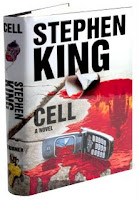

Pretty soon everything has gone to hell and the survivors are either cowering in their homes or fleeing down the road while the "phone people" roam the streets. Everyone who picks up a cell phone gets hit with it: the signal basically reprograms their brain, turning them into mindless zombies who attack everyone around them. He takes an idea and runs with it, and who cares if all the parts make sense?Ĭlayton Riddell (King seemed to go through a Clayton phase) has just scored a deal that will make him financially solvent when the "pulse" happens. But King has never been big on plausibility in his sci-fi, and the premise of this book is a typical King science fantasy requiring complete suspension of disbelief. Written in 2006, Cell is already a little bit dated, like that flip-top model (which looks a lot like mine.), since all the references are to cell phone technology as of 2006.

Who doesn't have one? Stephen King's utterly gripping, gory, and fascinating novel doesn't just ask the question "Can you hear me now?" It answers it with a vengeance. There are one hundred and ninety-three million cell phones in the United States alone. Clay and the few desperate survivors who join him suddenly find themselves in the pitch-black night of civilization's darkest age, surrounded by chaos, carnage, and a human horde that has been reduced to its basest nature.and then begins to evolve. The cause of the devastation is a phenomenon that will come to be known as The Pulse, and the delivery method is a cell phone. Why not a little treat for himself? Clay's feeling good about the future. He's already picked up a gift for his long-suffering wife, and he knows just what he'll get for his boy Johnny. He's just landed a comic book deal that might finally enable him to support his family by making art instead of teaching it.


On October 1st, God is in His heaven, the stock market stands at 10,140, most of the planes are on time, and Clayton Riddell, an artist from Maine, is almost bouncing up Boylston Street in Boston.


 0 kommentar(er)
0 kommentar(er)
